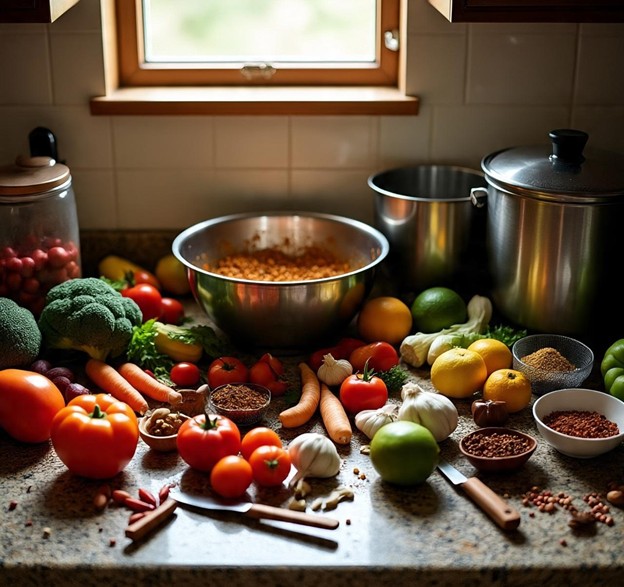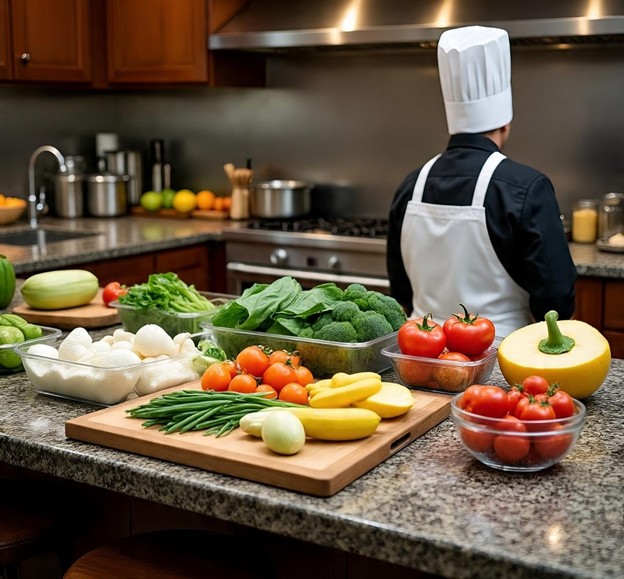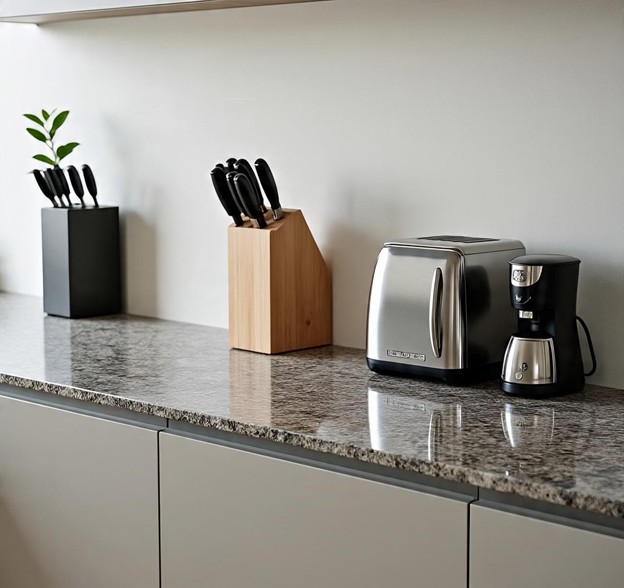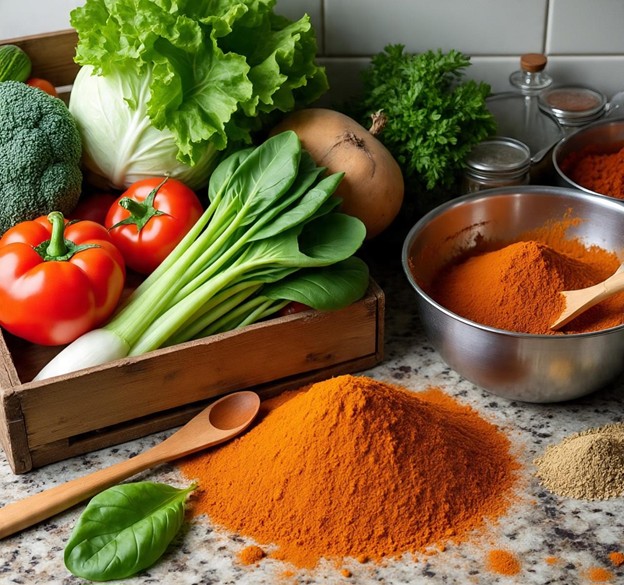I used to love cooking,” she said, stirring her latte with a sigh that felt all too familiar, like the kind of resignation you hear when someone talks about a relationship that just didn’t work out. “Now I just order DoorDash and pretend I’m swamped with work.” The woman at the coffee shop table next to mine was having a conversation I’d heard countless times before—the gradual giving up of culinary dreams in the face of kitchen reality.

But then she said something that really hit me: “It’s not that I can’t cook. It’s just that my kitchen makes me feel stupid.” That one line revealed a truth about cooking that rarely gets mentioned—the environment can influence the experience far more than skill ever will.
I couldn’t shake her words from my mind. How many of us have let go of our cooking aspirations, not because we lack talent, but because our kitchens feel more like obstacle courses meant to test our patience rather than spaces that inspire our creativity?
The Neuroscience of Cluttered
That woman’s frustration goes beyond just her own feelings — studies indicate that visual clutter can significantly increase stress and anxiety for many individuals. NeuroscienceNews highlights research showing that a messy home can lead to cognitive overload and heightened anxiety for some people.
When your kitchen counters are piled high with random gadgets, expired spices, and that mysterious heap of “I’ll get to this later” stuff, your brain sees chaos. And chaos? It brings on stress. Stress stifles creativity, and creativity is what turns cooking from a mundane task into a delightful experience.
Research in environmental psychology and cognitive science shows that messy environments can really weigh us down mentally, while cleaner spaces help us focus better and make more room in our minds for the task at hand. When it comes to cooking, having that extra mental space means we can plan better and make fewer errors. (Check out studies on cooking as a task that requires executive function.)
But here’s the really interesting part: the effects aren’t just mental—they’re physical too. A cluttered kitchen can actually change how we move. We start to feel hesitant, rushed, and more prone to accidents. We might even cut corners (sometimes literally) because the space feels more like an obstacle than a helping hand.
The Restaurant Industry’s Dirty Secret About Mise en Place
For centuries, professional kitchens have kept a little secret under wraps, wrapped in fancy French lingo that makes it sound all high-end: mise en place. When you break it down, it simply means “put in place.” But at its core, it’s all about setting up an environment where success is practically guaranteed.

As chefs often say, keeping your station organized helps clear your mind. Research in cognitive science indicates that minimizing visual distractions can lighten your cognitive load, allowing you to save your mental energy for planning and monitoring—key skills when it comes to whipping up complex meals. (Check out Doherty et al., ‘The cooking task’ for more on this.)
Just think about it: when you’re scrambling to find the can opener while your onions are burning, or digging through drawers for measuring spoons while your sauce is separating, or trying to clear off counter space while your timer is ticking down—you’re not really cooking. You’re just managing a crisis.
In restaurant kitchens, they tackle this mental overload with strict organization. Every tool has its designated spot. Every ingredient is right at your fingertips. Every surface is clear and ready for whatever comes next. They’ve crafted spaces where getting into the zone feels effortless rather than a happy accident.
The 15-Minute Morning Ritual That Changed Everything
After that chat at the coffee shop, I found myself really curious about how the space around us affects our cooking. So, I dove into some experiments in my own kitchen and stumbled upon something that completely changed how I approach food prep.

The game-changer was what I now call the “15-Minute Reset Protocol.” Each morning, before I even sip my coffee or scroll through my phone, I dedicate fifteen minutes to turning chaos into order.
But don’t get me wrong—this isn’t about obsessively cleaning. It’s about smart preparation that smooths out the cooking process. Here’s what those fifteen minutes do for me:
Clear Surfaces = Clear Mind
I clear off every counter except for the essentials: the coffee maker, knife block, and cutting board. Everything else gets tucked away in cabinets or drawers.
Visual Breathing Room
With clear surfaces, my mind can focus on being creative instead of figuring out where things are. I start seeing opportunities instead of roadblocks.
Tool Accessibility
The items I use most often are kept within easy reach. This isn’t about making things look pretty—it’s about cutting down on the mental and physical effort it takes to whip up delicious meals.
The change was instant and significant. Cooking transformed from a chore into a joyful experience. When I could find everything I needed right away, when I had the space to work freely, and when my environment supported my efforts instead of getting in the way—everything shifted.
The Psychology of Cooking Confidence
At KitchenSupports, we’ve seen this happen time and time again. Customers who take the time to reorganize their kitchens often find that their cooking experience becomes much more enjoyable, even before they invest in any new tools or gadgets.
The link between a tidy space and a boost in confidence goes beyond just convenience. An organized kitchen sends a message of competence to its users. When everything is in its designated spot, you start to feel like you really have your life together. And when people feel capable, they tend to experiment more in the kitchen.
Some studies in behavioral research indicate that individuals who work in tidier environments often feel more self-assured and are more open to trying out new activities — like cooking. It’s clear that a well-arranged space not only enhances cooking but also fosters culinary creativity.
The Counter Space Revelation
Here’s a thought that might just flip your perspective on kitchen space: Many home cooks realize that they only really use a small section of their counter while cooking. This highlights just how beneficial it can be to clear even a tiny area to improve your workflow. Yet, many of us treat our counters more like storage units than actual workspaces.
In professional kitchens, they take this idea to heart. They know that having a clear area to work is far more important than cramming in storage. Each station is designed with plenty of room for chopping, mixing, plating, and moving around.
The big takeaway? You don’t necessarily need a larger kitchen; you just need to set clearer boundaries between where you work and where you store things. Those small appliances cluttering your counters? They’re not helping; they’re just getting in the way. And that pretty fruit bowl? It’s taking up space that could be fueling your culinary creativity.
When I started applying this concept in my own kitchen, the transformation was incredible. I suddenly had space to work, room to lay out my ingredients, and enough area to plate my dishes beautifully. My kitchen shifted from feeling cramped to feeling open and inviting, all without making any major renovations.
The Tool Philosophy That Eliminates Kitchen Frustration
The woman at the coffee shop talked about feeling “stupid” in her kitchen, and I totally get that. It’s that frustrating moment when your tools seem to be working against you instead of helping out. The fix isn’t about having more tools; it’s about having the right ones in the right spots.

In professional kitchens, there’s a straightforward rule: how often you use something should dictate where you keep it. Daily essentials get the best spots, while things you use weekly are stored a bit further away. Items you only need once a month? They go in the back of the cupboard.
This isn’t exactly rocket science, but it’s a principle that often gets overlooked in home kitchens. We usually put things away based on where they fit rather than where we actually need them. The outcome? A lot of time spent searching and getting frustrated instead of enjoying the cooking process.
Chefs and culinary experts set up their stations to cut down on searching and unnecessary movement. The concept of mise en place is all about keeping everything you need within arm’s reach, allowing cooks to focus more on the art of cooking rather than getting caught up in logistics. On the flip side, home cooks flip those numbers, spending most of their time on logistics rather than unleashing their creativity.
The Flow State Factory
When everything falls into place—clean surfaces, smart tool arrangement, and a well-thought-out organization—something truly special happens. Cooking shifts from a series of disjointed tasks into a smooth, flowing expression of creativity.
To reach that flow state, certain conditions need to be met: clear objectives, instant feedback, and a distraction-free environment. An organized kitchen naturally provides all three. You know exactly what you’re aiming for, you can see and taste your results right away, and nothing disrupts your creative journey.
The woman at the coffee shop had given up on cooking because her kitchen stifled her flow instead of nurturing it. Each meal turned into a battle against her surroundings rather than a joyful dance with her ingredients.
Your kitchen should be a place where creativity flourishes, not a battleground you face every day. By tackling the biggest hurdles, you might just find that spark of joy that first inspired you to cook. Even just clearing a small section of your counter—about a foot—can make a world of difference in how you approach your cooking.
Are you ready to turn your kitchen from a challenging maze into a creative haven? You don’t have to go all out with a full renovation — sometimes, just clearing a small section of your counter (about a foot wide) can make a world of difference in creating a functional workspace and enhancing your cooking experience. The change starts with tidying up that little strip of counter and noticing how much it can elevate your cooking game!


